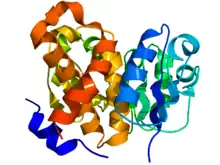CARKD
Carbohydrate kinase domain containing protein (abbreviated as CARKD), encoded by CARKD gene, is a human protein of unknown function. The CARKD gene encodes proteins with a predicted mitochondrial propeptide (mCARKD), a signal peptide (spCARKD) or neither of them (cCARKD). Confocal microscopy analysis of transfected CHO (Chinese-hamster ovary) cells indicated that cCARKD remains in the cytosol, whereas mCARKD and spCARKD are targeted to the mitochondria and the endoplasmic reticulum respectively.[6] The protein is conserved throughout many species, and has predicted orthologs through eukaryotes, bacteria, and archea.
| Carbohydrate kinase | |||||||||||
|---|---|---|---|---|---|---|---|---|---|---|---|
 Crystallographic structure of a putative Bacillus subtilis carbohydrate kinase (rainbow colored, N-terminus = blue, C-terminus = red).[5] | |||||||||||
| Identifiers | |||||||||||
| Symbol | Carb_kinase | ||||||||||
| Pfam | PF01256 | ||||||||||
| Pfam clan | CL0118 | ||||||||||
| InterPro | IPR000631 | ||||||||||
| PROSITE | PDOC00806 | ||||||||||
| SCOP2 | 1kyh / SCOPe / SUPFAM | ||||||||||
| |||||||||||
Structure
Gene
Human CARKD gene has 10 exons and resides on Chromosome 13 at q34. The following genes are near CARKD on the chromosome:[7]
Protein
This protein is part of the phosphomethylpyrimidine kinase: ribokinase / pfkB superfamily. This family is characterized by the presence of a domain shared by the family.[8] CARKD contains a carbohydrate kinase domain (Pfam PF01256).[8] This family is related to Pfam PF02210 and Pfam PF00294 implying that it also is a carbohydrate kinase.
Predicted properties
The following properties of CARKD were predicted using bioinformatic analysis:
- Molecular Weight: 41.4 KDal[9]
- Isoelectric point: 9.377[10]
- CARKD orthologs have highly variable isoelectric points.[10]
- Post-translational modification: Three post-translational modifications are predicted:
- Modified Phosphotyrosine Residue[11]
- Two N-Linked Glycosylation Sites[11]
- A Signal Peptide and signal peptide cleavage site was predicted.[12]
Function
Tissue distribution
CARKD appears to be ubiquitously expressed at high levels. Expression data in the human protein, and the mouse ortholog, indicate its expression in almost all tissues.[13][14] One peculiar expression pattern of CARKD is its differential expression through the development of oligodendrocytes. Its expression is lower in oligodendrocyte progenitor cells than in mature oligodendrocytes.[15]
Binding partners
The human protein apolipoprotein A-1 binding precursor (APOA1BP) was predicted to be a binding partner for CARKD.[16] This prediction is based on co-occurrence across genomes and co-expression. In addition to these data, the orthologs of CARKD in E. coli contain a domain similar to APOA1BP. This indicates that the two proteins are likely to have originated from a common evolutionary ancestor and, according to Rosetta stone analysis theory,[17] are likely interaction partners even in species such as humans where the two proteins are not produced as a single polypeptide.
Clinical significance
Based on allele-specific expression of CARKD, CARKD may play a role in acute lymphoblastic leukemia.[18] In addition, microarray data indicates that CARKD is up-regulated in Glioblastoma multiforme tumors.[19]
References
- GRCh38: Ensembl release 89: ENSG00000213995 - Ensembl, May 2017
- GRCm38: Ensembl release 89: ENSMUSG00000031505 - Ensembl, May 2017
- "Human PubMed Reference:". National Center for Biotechnology Information, U.S. National Library of Medicine.
- "Mouse PubMed Reference:". National Center for Biotechnology Information, U.S. National Library of Medicine.
- PDB: 1kyh; Zhang RG, Grembecka J, Vinokour E, Collart F, Dementieva I, Minor W, Joachimiak A (September 2002). "Structure of Bacillus subtilis YXKO--a member of the UPF0031 family and a putative kinase". Journal of Structural Biology. 139 (3): 161–70. doi:10.1016/S1047-8477(02)00532-4. PMC 2793413. PMID 12457846.
- Marbaix, AY; Tyteca, D; Niehaus, TD; Hanson, AD; Linster, CL; Van Schaftingen, E (15 May 2014). "Occurrence and subcellular distribution of the NADPHX repair system in mammals". The Biochemical Journal. 460 (1): 49–58. doi:10.1042/bj20131482. PMID 24611804.
- "UCSC Genome Browser: CARKD".
- "CDD: Conserved Domain Database (NCBI)".
- Brendel V, Bucher P, Nourbakhsh IR, Blaisdell BE, Karlin S (March 1992). "Methods and algorithms for statistical analysis of protein sequences". Proceedings of the National Academy of Sciences of the United States of America. 89 (6): 2002–6. doi:10.1073/pnas.89.6.2002. PMC 48584. PMID 1549558.
- "PI Program (Isoelectric Point Prediction)". Archived from the original on 2008-10-26.
- "UniProt Database".
- Bendtsen JD, Nielsen H, von Heijne G, Brunak S (July 2004). "Improved prediction of signal peptides: SignalP 3.0". Journal of Molecular Biology. 340 (4): 783–95. CiteSeerX 10.1.1.165.2784. doi:10.1016/j.jmb.2004.05.028. PMID 15223320.
- "Unigene (EST profile viewer) Human CARKD".
- "Unigene (EST profile viewer) Mouse CARKD".
- Nielsen JA, Maric D, Lau P, Barker JL, Hudson LD (September 2006). "Identification of a novel oligodendrocyte cell adhesion protein using gene expression profiling". Journal of Neuroscience. 26 (39): 9881–91. doi:10.1523/JNEUROSCI.2246-06.2006. PMC 1613258. PMID 17005852.
- "STRING: Known and Predicted Protein-Protein Interactions".
- Date SV (2008). The Rosetta stone method. Methods Mol Biol. Methods in Molecular Biology™. 453. pp. 169–80. doi:10.1007/978-1-60327-429-6_7. ISBN 978-1-60327-428-9. PMID 18712302.
- Milani L, Lundmark A, Nordlund J, Kiialainen A, Flaegstad T, Jonmundsson G, Kanerva J, Schmiegelow K, Gunderson KL, Lönnerholm G, Syvänen AC (January 2009). "Allele-specific gene expression patterns in primary leukemic cells reveal regulation of gene expression by CpG site methylation". Genome Research. 19 (1): 1–11. doi:10.1101/gr.083931.108. PMC 2612957. PMID 18997001.
- Ruano Y, Mollejo M, Ribalta T, Fiaño C, Camacho FI, Gómez E, de Lope AR, Hernández-Moneo JL, Martínez P, Meléndez B (2006). "Identification of novel candidate target genes in amplicons of Glioblastoma multiforme tumors detected by expression and CGH microarray profiling". Molecular Cancer. 5 (1): 39. doi:10.1186/1476-4598-5-39. PMC 1592108. PMID 17002787.
External links
- Human CARKD genome location and CARKD gene details page in the UCSC Genome Browser.



